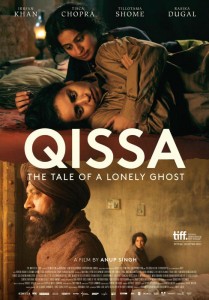Originally published in July of 2014 check out our review of Qissa from the London Indian Film Festival
 The largest human mass migration known to history is the Partition of India, 1947. Glossed over as the “independence” of India, this tragic and controversial event forced an estimated 10 million civilians to lose their homes and an estimated 1 million to lose their lives. The statistics with their definite tone conceals the complexities, the tragedies and the trauma of Partition.
The largest human mass migration known to history is the Partition of India, 1947. Glossed over as the “independence” of India, this tragic and controversial event forced an estimated 10 million civilians to lose their homes and an estimated 1 million to lose their lives. The statistics with their definite tone conceals the complexities, the tragedies and the trauma of Partition.
Both literature and film have become powerful mediums for re-visiting this time in history and Qissa (Director Anup Singh) is one such film. Brimming over with raw emotion, immaculate performances and a Pandora’s Box of questions, Qissa is a rare gem of a film that will shake you up and ask what identity and belonging truly mean.
When Umber Singh (Irrfan Khan) and his family are uprooted from their home in the midst of Partition, the trauma and loss of identity becomes a catalyst for a struggle between reality and delusion. Perhaps this symbolises the struggle to accept the reality of the horror of Partition. Obsessed with having a heir after three daughters, Umber Singh hides the gender of his fourth child and brings her up as a son, Kanwar Singh (Tillotama Shome).
We are told that it takes four years for Umber Singh to “re-build” his life. However, it is clear that there is something broken inside Umber Singh that he does not confront- but is this irreparable and does Umber Singh portray a broken man who deserves sympathy or a patriarchal tyrant who shoulders the responsibility of shocking consequences? Why is Umber Singh frighteningly obsessed with a having a son? True, this obsession unfortunately echoes the still relevant, popular South Asian mindset of a male child being preferable to a female child. However, in the context of a death ridden Partition, perhaps Umber Singh’s obsession symbolises his desire for the continuation of the family name that a male child traditionally offers.
The complexities of Qissa are intensified through the breath-taking cinematography, certainly a strength of the film. The night shots of the moon not only carry connotations of loneliness and darkness but of hope and desire.
 The foundational strength of the film is the performances. Without the depth of the performances, the film would not have been as powerful as it is. The cast in particular that touch a chord are: Irrfan Khan as Umber Singh, Tillotama Shome as Kanwar and Rasika Dugal as Neeli.
The foundational strength of the film is the performances. Without the depth of the performances, the film would not have been as powerful as it is. The cast in particular that touch a chord are: Irrfan Khan as Umber Singh, Tillotama Shome as Kanwar and Rasika Dugal as Neeli.
Umber Singh comes across as a good man gone mad. His love for his son Kunwar Singh is presented as an addiction almost; it is not the “son” he loves, but the idea of the son. A bond profusely explored through the film is the bond between a parent and a child. Qissa delves into questioning what makes a parents’ love for a child conditional or unconditional. Irrfan Khan’s nuanced performance presents the audience with a character who has much simmering underneath the surface. His spontaneous emotion comes out powerfully in waves.
Umber Singh is not the only “the lonely ghost” who loses his identity with the Partition- Kanwar Singh also becomes a “ghost”: an entity existing yet not allowed to fully exist through the concealing of Kanwar Singh’s gender as female. This not only emphasises the women’s history of Partition being hidden away due to the shame and stigma set up by society, but also that the Partition impacts generations not present during the actual event. Kanwar Singh as the “son” portrays the confusion of who he is yet carries himself with perfect confidence. The paradox is moving: the body language may portray power but the turmoil inside churns with uncertainty. Significant to remember is that the partition was a displacement of identity. Perhaps Kanwar Singh personifies this. Through him, the question of what gender is becomes apparent. Is gender taught or is gender biological? Or perhaps, is gender actually an innate emotion devoid of both social construct and biology?
Neeli is a character symbolising female strength and a threat to patriarchy. She questions the norm and reaches out for her right to choose what she wants and how she wishes to live her life. Although patriarchy is suggested as ultimately powerful, women are depended upon and therefore, make the male vulnerable to her power.
 A central element of the film is the same-sex love between Kanwar Singh and Neeli powerfully represented as a loving and emotional bond; therefore challenging the notion that homosexuality is only about sexual intercourse. The relationship between the two females brings up the question, can same-sex love only be “accepted” and allowed to exist behind closed doors in South Asian society whilst hidden?
A central element of the film is the same-sex love between Kanwar Singh and Neeli powerfully represented as a loving and emotional bond; therefore challenging the notion that homosexuality is only about sexual intercourse. The relationship between the two females brings up the question, can same-sex love only be “accepted” and allowed to exist behind closed doors in South Asian society whilst hidden?
Regarding the Partition of India, Gandhi had stated his disappointment and foreboding sense of doom, a theme echoing through Qissa: “Freedom has come but it leaves me cold… I have come to the conclusion that our way was non-violent only superficially; our hearts were violent. It was enough to displace the foreign power. But the violence nursed within has broken out in a way least expected. Heaven knows where it will lead us.”
Qissa is an artistic and hard hitting exploration of:
What is “home”?
What is “identity”?
What is “belonging”?
The biggest question raised was whether these factors need to be inter-related and what the consequences may be if one does not break away from the ghosts of the past.








